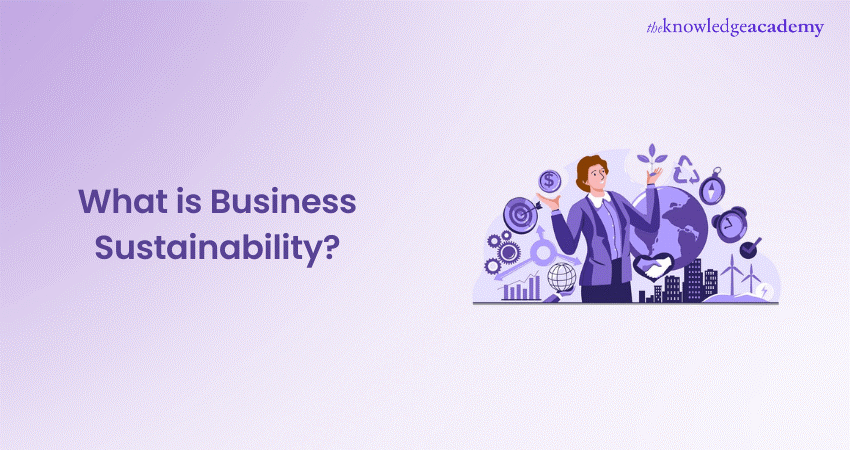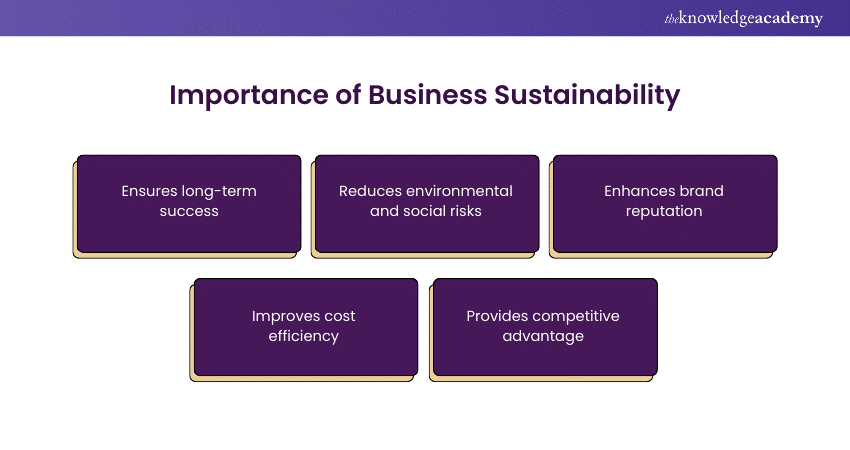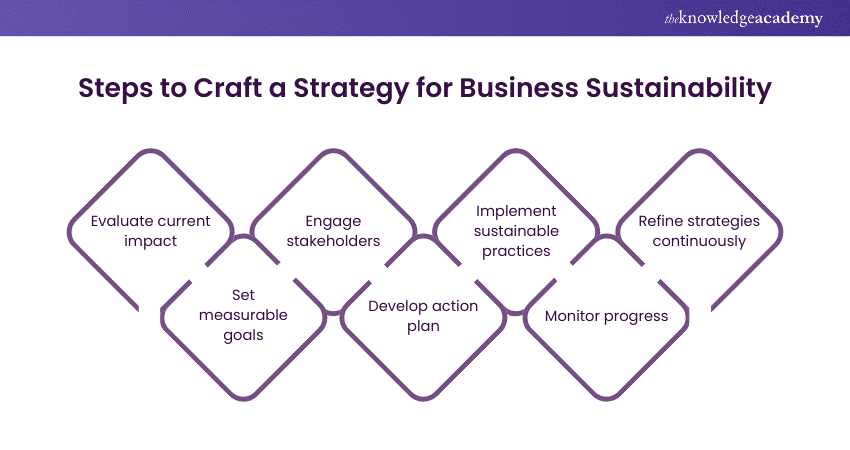We may not have the course you’re looking for. If you enquire or give us a call on +44 1344 203999 and speak to our training experts, we may still be able to help with your training requirements.
Training Outcomes Within Your Budget!
We ensure quality, budget-alignment, and timely delivery by our expert instructors.

Have you heard the buzz about Business Sustainability but are unsure what it truly entails? In modern businesses, consumers and investors are increasingly seeking out companies that prioritise more than just profit. Business Sustainability is the key!
Imagine a business that thrives while minimising its environmental impact, fostering a healthy work environment, and contributing positively to society. That's the essence of Business Sustainability. This comprehensive blog will take you beyond the buzzwords.
We'll break down the core principles of sustainable business practices, exploring how they benefit companies, the environment, and society. By the end, you'll gain a clear understanding of why Business Sustainability is not just a trend, but a tactical imperative for long-term success. So, buckle up and get ready to discover how your business can thrive in a sustainable future!
Table of Contents
1) What is Business Sustainability?
2) Types of Sustainability
3) How to Create a More Sustainable Business Strategy
4) Advantages of Business Sustainability
5) Challenges with Sustainability in Business
6) Domains of Corporate Sustainability
7) Conclusion
What is Business Sustainability?
Corporate Sustainability, also known as Business Sustainability, involves a company's holistic approach to managing financial, social, and environmental issues to achieve ethical, responsible, and continuous success.

Historically, in corporate culture, there has been a perceived tension between financial objectives and social or environmental considerations. For instance, the ongoing exploitation of finite natural resources is not a viable long-term practice. Nonetheless, due to the initial costs associated with transitioning to eco-friendlier alternatives and updating infrastructure, companies often opt for the more economically feasible short-term solution of using fossil fuels for energy.
However, adopting environmentally friendly practices can enhance a company's long-term sustainability by lowering energy expenses, reducing its carbon footprint, and mitigating risks associated with climate change. In a similar vein, while upfront investments in ethical and socially responsible practices may be higher, they can result in improved hiring, stronger branding, better public relations, and ultimately, greater profitability.
Types of Sustainability
The concept of Business Sustainability rests on three foundational elements: Environmental, social, and economic demands, collectively known as the three pillars. Within the corporate sphere, these are often encapsulated by the term triple bottom line, which is a framework that shifts focus from the traditional profit-centric bottom line to include a company’s social and environmental contributions and overall economic impact.
1) Environmental sustainability
This aspect receives significant attention from corporations and involves initiatives to enhance energy efficiency in data centers and other infrastructures, reduce carbon emissions, minimise packaging waste, and conserve water, among other environmental considerations.
2) Social sustainability
This pillar emphasises corporate social responsibility (CSR), aiming to create a business that is supported by customers, the local community, employees, and investors. It encourages companies to engage in fair labour practices and to foster long-term community relationships through philanthropy and other community-oriented activities.
3) Economic sustainability
This focuses on ensuring the long-term profitability of a business. It encompasses corporate governance, risk management, regulatory compliance, ethical business conduct, and financial transparency.
How to Create a More Sustainable Business Strategy?
Creating a sustainable business strategy involves integrating environmentally friendly practices and long-term planning into your business operations. Start by assessing your current environmental impact and setting clear sustainability goals.
1) Assess the Problem and Define Objectives
Initiating change begins with understanding the significance of sustainability for your team, organisation, sector, and clientele. Reflect on the major issues that each stakeholder group deems critical.
To navigate this evaluation, you might ponder the following inquiries:
a) What volume of waste is being generated by our organisation?
b) Is there a challenge with the current company culture?
c) Do our recruitment strategies draw in a variety of job applicants?
d) Does our product cater to the needs of a specific demographic?
e) What kind of influence does our business exert on the community?
Addressing these queries can aid in formulating your firm’s sustainability goals. If you are struggling to pinpoint your sustainability goals, employ the SMART Goals during this phase. Ensuring that your objectives are Specific, Measurable, Achievable, Relevant, and Time-bound at this initial stage can streamline your efforts down the line.
2) Establish Your Mission
Once your team has reached a consensus on specific goals, the next step is to articulate your company’s mission. A clear and compelling mission statement is a vital component of a business’s journey towards greater sustainability.
A well-crafted mission statement should reflect your company’s commitment to action. It encapsulates the core values and mission of your organisation, acting as a beacon that illuminates the reasons behind your activities. Essentially, your mission statement should clarify the five Ws of your company:
a) Who you are?
b) What do you do?
c) When do you operate?
d) Where are you located?
e) Why do you exist?
As your company grows, your mission statement should be adaptable enough to evolve alongside it. It should support your business’s ability to adapt to market changes and maintain its capacity for innovation and disruption. Ensure that your mission statement is broad enough to encompass your objectives, yet specific enough to remain meaningful.
Here are two examples of effective mission statements from well-known businesses:
a) REI: “To inspire, educate and outfit for a lifetime of outdoor adventure and stewardship.” This statement from Recreational Equipment Incorporated (REI) not only highlights the quality of their outdoor products but also their commitment to environmental stewardship and customer engagement.
b) American Express: “To become essential to our customers by providing differentiated products and services to help them achieve their aspirations.” American Express’s mission statement emphasises their goal to be indispensable to their customers through unique offerings that support their customers’ dreams.
These examples demonstrate how a mission statement can succinctly convey a company’s essence, values, and commitment to its customers and the broader community.
3) Craft Your Strategy
Formulating a strong mission statement is the precursor to aligning your organisation with a sustainable business approach.

In devising such a strategy, it’s essential to balance the imperative of remaining profitable with the pursuit of sustainability. After all, your business must thrive to make a difference. Evidence suggests that sustainability can indeed bolster profitability.
Reflect on the triple bottom line concept, which assesses a company’s influence on profit, people, and the planet. This framework guides the development of a business strategy that is both sustainable and economically sound.
Even modest initiatives can spark significant change. For example, consider the potential savings if your company were to turn off electricity and heating overnight when the office is empty. Implementing timers or motion sensors could lead to substantial cost and energy conservation.
Consumer behavior also supports sustainability; a Unilever study indicated that 33% of consumers prefer to purchase from brands that contribute to social or environmental welfare, signaling a market for sustainably produced goods.
Investigate strategies specific to your industry that can enhance operational efficiency while fostering social and internal value. Diligent efforts in crafting a comprehensive sustainability strategy can yield enduring benefits for both your enterprise and the environment.
4) Implement Strategy and Assess Results
Moving from a renewed commitment to excellence and benevolence to taking actionable steps, making public commitments, and delivering measurable outcomes marks a significant transition. With a clear mission and strategy in place, you’re poised to advance toward your goals.
As you put your strategy into action, it’s important to regularly review and adjust your approach to ensure that your goals, mission, and achievements stay in sync. If you’re uncertain about how to begin, identify areas where your mission can make an immediate, significant impact. Collaborating with an organisation that shares your values can accelerate progress. Such partnerships can also lend additional credibility to your efforts.
Tap into your untapped capabilities and soar to new heights in your career with our comprehensive Management Courses, Join today
Advantages of Business Sustainability
1) Competitive edge
With 60% of consumers considering environmental responsibility as a key factor in brand selection, being recognised as a sustainable business can enhance brand visibility and attract customers who prioritise eco-friendly practices.
2) Attractiveness to investors
In 2021, a substantial majority of individual investors were gearing up to incorporate sustainability and social responsibility into their investment decisions within the next year.
3) Adherence to regulatory standards
As governments expand sustainability regulations and corporate Sustainable Development Goals (SDGs), proactive adoption of sustainable solutions positions companies to meet evolving standards and effectively track, assess, and disclose ESG performance.
4) Extended lifespan of investment in transformation
The pandemic has spurred digital transformation across industries. Sustainable transformation strategies fortify businesses against disruptions and open up new opportunities.
5) Talent recruitment
A growing number of job seekers are drawn to companies with a commitment to sustainability and social responsibility. Cultivating a sustainable image helps attract and retain employees aligned with these values.
6) Revenue expansion
Sustainable practices that cut resource use and enhance operational efficiency position innovators for future success, boosting the bottom line. Although initial costs may be higher, the long-term financial benefits validate the investments.
Acquire the key competencies for successful communication, teamwork, and leadership, accessible from any location – join our Managing Remote Teams Course today!
Challenges with Sustainability in Business
1) Customer preparedness
As attitudes towards sustainability evolve, businesses must neither lag behind nor surge too far ahead of their customers’ demand for sustainable products. Crafting a sustainable future is a collaborative effort that necessitates a profound comprehension of customer needs and the cultivation of partnerships that can support this transition.
2) Expense
Adopting sustainable practices often entails significant initial investments. In the short term, maintaining current operations may seem more cost-effective. Organisations may require assistance in demonstrating how early investments can lead to sustained, long-term profitability.
3) Structural Resistance
Sustainability, while a noble objective, may not always be prioritised over immediate, short-term gains. Businesses that plan on a decadal basis may find that distant commitments, such as those set for 2050, do not incite adequate action in the present decade. The key lies in reinterpreting risks as opportunities and advocating that immediate action on sustainability is crucial for enduring business viability.
4) Absence of Tools, Knowledge, and Expertise
The absence of necessary tools, insights, and expertise poses a significant risk for companies attempting to forge a sustainability vision, strategy, and framework. As the landscape of sustainability continues to shift, businesses must seek out innovative partners to assist in navigating this evolving terrain and in shaping a sustainable future.
Elevate your career trajectory with our Personal & Organisational Development Course – sign up now to begin a path of personal and professional advancement!
Domains of Corporate Sustainability
In the journey towards Corporate Sustainability, businesses should concentrate on five strategic areas to ensure resilience and profitability:
a) Climate Risk Management and Environmental, Social and Governance (ESG) Reporting: With an unprecedented number of natural disasters in the last decade, companies must integrate climate change considerations into their operations. Utilising a combination of data sources and advanced analytics, organisations can anticipate and prepare for extreme weather events, fostering sustainable growth and maintaining continuity. Streamlining ESG compliance and reporting also helps reduce operational costs.
b) Resilient Infrastructure and Intelligent Operations: The global issues of climate change, environmental degradation, and resource management necessitate resilient infrastructure. Through intelligent asset management and predictive maintenance, businesses can prolong asset lifespans, cut downtime, reduce emissions, and support ESG objectives profitably.
c) Sustainable Supply Chains and Circularity: As consumer demand for product traceability grows, supply chain leaders are investing in circular economies that promote reuse. Blockchain technology enhances supply chain transparency, ensuring product authenticity from production to consumption, reducing waste, and lowering costs. Advanced AI helps address complex emissions challenges and optimise logistics.
d) Electrification, Energy, and Emissions Reduction: The shift to clean electrification is essential for a net-zero greenhouse gas emissions future. Companies must improve grid efficiency and resilience through intelligent asset management. Smart metering provides insights into resource usage, optimising asset and resource efficiency, reducing costs, and automating services.
e) Sustainability Strategy: To operationalise sustainability at scale, companies must weave it into their business framework. This approach fosters new business models and platforms that meet sustainability objectives, enhance operational efficiency, adhere to regulations, uncover innovation opportunities, and improve customer experiences, thereby gaining a competitive edge.
Conclusion
In conclusion, Business Sustainability is essential for long-term success, balancing profitability with environmental and social responsibilities. By adopting sustainable practices, businesses can reduce risks, improve their reputation, and ensure future growth. Embracing sustainability is not just an option anymore but a necessity in today’s evolving economic landscape.
Harness the collective power of your team with our tailored Performance Management Training – secure your place today!
Frequently Asked Questions

Businesses face challenges in pursuing sustainability goals, including high implementation costs, regulatory compliance, supply chain complexities, and balancing short-term profits with long-term sustainability. Overcoming these obstacles requires strategic planning, innovation, and stakeholder collaboration.

Businesses can communicate sustainability efforts effectively by being transparent, using clear metrics, engaging through various media channels, sharing success stories, and involving stakeholders in sustainability initiatives, thus building trust and demonstrating commitment to responsible practices.

CSR and Business Sustainability are interconnected, with CSR focusing on ethical practices and social impact, while sustainability emphasises long-term environmental and economic health. Together, they enhance a company’s reputation, stakeholder trust, and overall success.

The Knowledge Academy takes global learning to new heights, offering over 30,000 online courses across 490+ locations in 220 countries. This expansive reach ensures accessibility and convenience for learners worldwide.
Alongside our diverse Online Course Catalogue, encompassing 17 major categories, we go the extra mile by providing a plethora of free educational Online Resources like News updates, Blogs, videos, webinars, and interview questions. Tailoring learning experiences further, professionals can maximise value with customisable Course Bundles of TKA.

The Knowledge Academy’s Knowledge Pass, a prepaid voucher, adds another layer of flexibility, allowing course bookings over a 12-month period. Join us on a journey where education knows no bounds.

The Knowledge Academy offers various Management Courses, including the Business Sustainability Course, Senior Management Training, and Event Management Course. These courses cater to different skill levels, providing comprehensive insights into Business Process Improvement Tools.
Our Business Skills Blogs cover a range of topics related to Sustainability Practices in Business, offering valuable resources, best practices, and industry insights. Whether you are a beginner or looking to advance your Business skills, The Knowledge Academy's diverse courses and informative blogs have got you covered.
Upcoming Business Skills Resources Batches & Dates
Date
 Business Sustainability Course
Business Sustainability Course
Fri 27th Dec 2024
Fri 3rd Jan 2025
Fri 28th Mar 2025
Fri 23rd May 2025
Fri 4th Jul 2025
Fri 5th Sep 2025
Fri 24th Oct 2025







 Top Rated Course
Top Rated Course



 If you wish to make any changes to your course, please
If you wish to make any changes to your course, please


